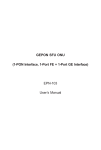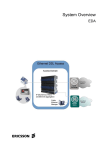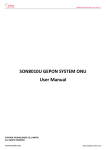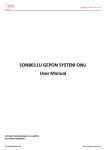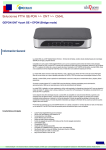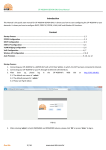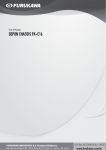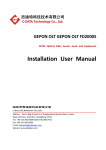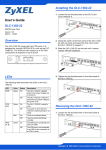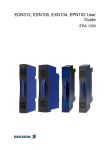Download GEPON SFU ONU User's Manual - PLANET Technology Corporation.
Transcript
GEPON SFU ONU EPN-102 / EPN-104 User's Manual 1 Copyright Copyright© 2009 by PLANET Technology Corp. All rights reserved. No part of this publication may be reproduced, transmitted, transcribed, stored in a retrieval system, or translated into any language or computer language, in any form or by any means, electronic, mechanical, magnetic, optical, chemical, manual or otherwise, without the prior written permission of PLANET. PLANET makes no representations or warranties, either expressed or implied, with respect to the contents hereof and specifically disclaims any warranties, merchantability or fitness for any particular purpose. Any software described in this manual is sold or licensed "as is". Should the programs prove defective following their purchase, the buyer (and not this company, its distributor, or its dealer) assumes the entire cost of all necessary servicing, repair, and any incidental or consequential damages resulting from any defect in the software. Further, this company reserves the right to revise this publication and to make changes from time to time in the contents hereof without obligation to notify any person of such revision or changes. All brand and product names mentioned in this manual are trademarks and/or registered trademarks of their respective holders. Federal Communication Commission Interference Statement This equipment has been tested and found to comply with the limits for a Class B digital device, pursuant to Part 15 of FCC Rules. These limits are designed to provide reasonable protection against harmful interference in a residential installation. This equipment generates, uses, and can radiate radio frequency energy and, if not installed and used in accordance with the instructions, may cause harmful interference to radio communications. However, there is no guarantee that interference will not occur in a particular installation. If this equipment does cause harmful interference to radio or television reception, which can be determined by turning the equipment off and on, the user is encouraged to try to correct the interference by one or more of the following measures: 1. Reorient or relocate the receiving antenna. 2. Increase the separation between the equipment and receiver. 3. Connect the equipment into an outlet on a circuit different from that to which the receiver is connected. 4. Consult the dealer or an experienced radio technician for help. FCC Caution To assure continued compliance (example-use only shielded interface cables when connecting to computer or peripheral devices). Any changes or modifications not expressly approved by the party responsible for compliance could void the user’s authority to operate the equipment. This device complies with Part 15 of the FCC Rules. Operation is subject to the Following two conditions: (1) This device may not cause harmful interference, and (2) this Device must accept any interference received, including interference that may cause undesired operation. 2 Federal Communication Commission (FCC) Radiation Exposure Statement This equipment complies with FCC radiation exposure set forth for an uncontrolled environment. In order to avoid the possibility of exceeding the FCC radio frequency exposure limits, human proximity to the antenna shall not be less than 20 cm (8 inches) during normal operation. R&TTE Compliance Statement This equipment complies with all the requirements of DIRECTIVE 1999/5/EC OF THE EUROPEAN PARLIAMENT AND THE COUNCIL OF 9 March 1999 on radio equipment and telecommunication terminal Equipment and the mutual recognition of their conformity (R&TTE) The R&TTE Directive repeals and replaces in the directive 98/13/EEC (Telecommunications Terminal Equipment and Satellite Earth Station Equipment) As of April 8, 2000. WEEE Regulation To avoid the potential effects on the environment and human health as a result of the presence of hazardous substances in electrical and electronic equipment, end users of electrical and electronic equipment should understand the meaning of the crossed-out wheeled bin symbol. Do not dispose of WEEE as unsorted municipal waste and have to collect such WEEE separately. Safety This equipment is designed with the utmost care for the safety of those who install and use it. However, special attention must be paid to the dangers of electric shock and static electricity when working with electrical equipment. All guidelines of this and of the computer manufacture must therefore be allowed at all times to ensure the safe use of the equipment. Revision User’s Manual for GEPON SFU ONU Model: EPN-102 / EPN-104 Rev: 1.0 (Mar. 2009) Part No. EM-EPN102_104_v1 3 Table of Contents 1. INTRODUCTION .............................................................................................................5 1.1 Feature....................................................................................................................6 1.2 Package Contents..................................................................................................6 1.3 Physical Details......................................................................................................7 2. INSTALLATION ............................................................................................................11 2.1 Safety Requirement .............................................................................................11 2.2 Hardware Installation...........................................................................................11 2.3 Verifying the Installation .....................................................................................13 3. APPLICATION ..............................................................................................................14 3.1 GEPON Applications ...........................................................................................14 3.2 FTTx Applications (FTTH / FTTB) .......................................................................15 APPENDIX A: HARDWARE SPECIFICATION.................................................................16 4 1. Introduction With growing network services such as HDTV, IPTV, voice-over-IP (VoIP) and Multimedia broadband applications, the demand of broadband grows quickly. The present Broadband environment has not already accorded with needing. Passive Optical Network (PON) is the most promising NGN (Next Generation Networking) technology. As compared to other broadband access technologies such as xDSL and cable modem, Passive Optical Network (PON) technology offers some competing advantages, including a long-term life expectancy of the fiber infrastructure, lower operating costs through the reduction of “active” components, support up to 20km distance between equipment nodes, and most importantly, provide much greater bandwidth. PLANET EPN-102 / EPN-104 are the GEPON SFU ONU devices. The EPN-102 designed with one GEPON port, one standard 10Base-T/100Base-TX, one standard 10Base-T / 100Base-TX / 1000Base-TX Ethernet ports, and the EPN-104 designed with one GEPON port, four standard 10Base-T/100Base-TX Ethernet ports for subscriber access. As residential device of users or access device of users, it offers economical connection system of GEPON users, and high broadband service by connected to gateway or PC. Well satisfying the high speed access demand, GEPON has a more prosperous perspective. PLANET EPN-102 / EPN-104 provide the core functionality of an 802.3ah Ethernet Passive Optical Network (EPON) Optical Network Unit (ONU) solution. In addition, the device also offers some advanced functions such as QoS for Triple-play service, VLAN, Authentication and Encryption for Security. Users can choose different devices that fit the applications for residence, SOHO and SMB environment. 5 1.1 Feature Internet Access Features z PON interface complies with IEEE 802.3ah. z IEEE 802.3 compliant 10Base-T / 100Base-TX / 1000Base-TX Ethernet interface (EPN-102 only) z IEEE 802.3 compliant 10Base-T /100Base-TX Ethernet interface z IEEE 802.3ah compliant Forward Error Correction (FEC). z 128-bit Advanced Encryption Standard (AES) encryption for both downstream and upstream directions. z Supports buffer threshold reporting for compatibility with dynamic threshold control Dynamic Bandwidth Allocation (DBA) algorithms. z 802.1x authentication engine with remote administration for device and user authentication. z Supports 64 MAC Addresses z Supports 802.1Q VLAN z Supports 802.1P z 1.5 MB of integrated buffering z Supports up to 256 layer-2/3/4 classification rules z Supports full-duplex flow control z Full management through an Operation Administration Management (OAM) protocol based on IEEE 802.3ah. z Internal Management Information Base (MIB) counters for network statistics z Conforms to the requirements of the European Union Restriction on the use of Hazardous Substances (RoHS) Directive. 1.2 Package Contents EPN-102 / EPN-104 Unit x 1 Power Adapter x 1 Quick Installation Guide x 1 User’s Manual CD x 1 RJ-45 cable x 1 6 1.3 Physical Details Front Panel of EPN-102 Front Panel LED definition LED PWR Link PON FE GE State Description ON When the ONU is powered on and in ready state OFF When the ONU is powered off ON Service offered OFF No service offered Flash System alarm OFF Normal operation ON Ethernet Link up Flashing Receive / Transmit data OFF Ethernet Link down ON Ethernet Link up Flashing OFF Receive / Transmit data Ethernet Link down 7 Rear Panel of EPN-102 Rear Panel Port and Button Definition Connector ON / OFF RESET PWR 10/100 Description The power button is for turn on or turn off the ONU. The reset button can restore the default settings of device. To restore factory defaults, keep the device powered on and push a paper clip into the hole. Press down the button over 5 seconds and then release. Power connector with 12V DC 1A ONU is successfully connected to a device through the 10/100 Fast Ethernet port. If the FE LED is flashing, the ONU is actively sending or receiving data over that port. ONU is successfully connected to a device through the 10/100/1000 Gigabit 10/100/1000 Ethernet port. If the GE LED is flashing, the ONU is actively sending or receiving data over that port. PON The PON connector allows data communication between the ONU and the OLT through a single mode fiber. 8 Front Panel of EPN-104 Front Panel LED definition LED PWR Link PON Alarm LAN 1-4 State ON OFF ON OFF ON OFF Flashing OFF ON Flashing OFF Description When the ONU is powered on and in ready state When the ONU is powered off Service offered No service offered System alarm Normal operation Optical alarm Normal operation Ethernet Link up Receive / Transmit data Ethernet Link down 9 Rear Panel of EPN-104 Rear Panel Port and Button Definition Connector Description ON / OFF The power button is for turn on or turn off the ONU. The reset button can restore the default settings of device. To restore factory RESET defaults, keep the device powered on and push a paper clip into the hole. Press down the button over 5 seconds and then release. PWR Ethernet 1-4 PON Power connector with 12V DC 1A ONU is successfully connected to a device through the corresponding port (1, 2, 3, or 4). If the LED is flashing, the ONU is actively sending or receiving data over that port. The PON connector allows data communication between the ONU and the OLT through a single mode fiber. 10 2. Installation This chapter offers information about installing your ONU. If you are not familiar with the hardware or software parameters presented here, please consult your service provider for the values needed. 2.1 Safety Requirement Make sure the GEPON service is enabled. Ensure that the optical fiber is long enough to achieve the desired installation place. Put the ONU on a sturdy table. Don't open the device when the ONU is operating. Contact your local agent for permission if you want to remove the chassis. Allow about 10 cm of clearance around the ONU chassis for heat dissipation. 2.2 Hardware Installation Please connect the ONU to you devices as follow: Step 1. Connecting the RJ-45 network cable. a. Plug-in the RJ-45 cable to 10/100/1000 GE Port (EPN-102 only) or 10/100 FE Ports. b. Plug-in the other side to your host or devices. Step 2. Connecting the fiber cable. Before connecting, please note: Keep the optical connector and the optical fiber clean. Make sure the bending diameter of the fiber is more than 6cm.Otherwise; the optical signal loss may be increased. Cover a protective cap to guard against dust and water when the fiber is not used. a. Remove the protective cap of the optical fiber. b. Remove the protective cap of the ONU optical interface (PON interface). Insert the fiber into the PON interface. 11 Step 3. Connecting Power Adapter. a. Connect the power adapter to the power socket on the ONU. b. Insert the other end into a power outlet. c. Turn on the power-switch. Figure-1 EPN-102 connection diagram Figure-2 EPN-104 connection diagram 12 2.3 Verifying the Installation After power on the ONU, the Power LED will be bright and system starts to boot. When system is ready, the PON LED will be flash. If the PON connection is normal, the PON LED will be off and Link LED is ON. And then you can enjoy the high bandwidth connection via PON technology. Note: The PLANET GEPON Solution based on the Teknovus GEPON Technology. The ONU was designed with PLANET OLT EPL-4000 system. If you connect to third party OLT system, even the OLT is Teknovus solution; the PON connection still might be unstable and malfunction, that because the configurations of ONU must depend on the OLT settings. If the ONU can’t work properly with other brand OLT, please make sure your PON system and contact the third party OLT vendor for technical support. 13 3. Application 3.1 GEPON Applications The OLT device is deployed in the central office room. The ONU devices are connected to the OLT device through an optical splitter, which forms a P2MP (Point-to-Multipoint) topology, connect to the switches or the devices as computers, IP Phone, IP Surveillance for Triple Play Service. Shown as below Figure. Figure-3 GEPON Applications 14 3.2 FTTx Applications (FTTH / FTTB) Figure-4 FTTx Applications FTTx is the main trend and final target for the development of optical communication. It can provide the high speed bandwidth to users without traffic jam. GEPON technology is the most practical and feasible access solution for FTTx. OLT is setup in the central equipment room of a community, to connect to the backbone networks of data, video and voice applications. ONU can be deployed at residential homes via passive optical distribute network that spans up to 20km radius. ONU can be put in a building or an end user’s room. A user can choose to use the whole ONU alone or just one port of ONU, which is bandwidth configurable and isolated from the rest ports of the ONU. 15 Appendix A: Hardware Specification EPN-102 Product Model Hardware Transmission speed Wavelength Optical specification Connection cable Ports LAN WAN LED Indicators Button Software EPON Features GEPON SFU ONU EPN-102 Downstream: 1.25 Gbps Upstream: 1.25 Gbps Downstream: 1490nm Upstream: 1310nm Downstream: Min. receive sensitivity: -26dBm Max. receive saturation power: -3dBm Upstream: Min. output optical power: -1 dBm Max. output spectrum width (RMS): 3nm G.652 single mode fiber 1 x 10/100Base-TX, Auto-Negotiation, Auto MDI/MDI-X 1 x 10/100/1000Base-TX, Auto-Negotiation, Auto MDI/MDI-X 1 (1.25G EPON interface with SC type connector, 1000Base-PX-20) PWR, Link, PON, FE, GE 1 x reset button, 1 x power button Compliant with IEEE 802.3ah 802.3ah Forward Error Correction for an improved link budget Operation Administration Management (OAM) protocol based on IEEE 802.3ah Dynamic Bandwidth Allocation (DBA) Support Protocol / Feature IEEE 802.3 compliant 10Base-T/100Base-TX / 1000Base-TX 802.1Q VLAN 802.1P QoS Security 128-bit Advanced Encryption Standard (AES) encryption for both downstream and upstream directions 802.1x authentication engine with remote administration for device and user authentication QoS Supports QoS based upon Port, IEEE802.1p, IPv4 Type of Service (ToS) or Differentiated Services (Diff-Serv), IPv6 Traffic Class, 802.1Q VLAN ID, Destination MAC address or Source MAC address Management Cooperated with centre OLT, implement management configuration and software upgrade to ONU Other Features up to 8 Logical Link IDs (LLID) 64 MAC Addresses 40 Queues (20 upstream / 20 downstream) 1.5 MB of integrated buffering up to 256 layer-2/3/4 classification rules full-duplex 802.3x flow control and backpressure Internal Management Information Base (MIB) counters for network statistics Environment Specification Dimension (W x D x H) 176 x 124 x 35mm Power 12V DC, 1.0A Operating temperature: 0 ~ 50 Degree C Temperature: Humidity Storage temperature: -20 ~ 70 Degree C Operating Humidity: 10 ~ 90% non-condensing Storage Humidity: 5 ~ 95% non-condensing Emission FCC, CE 16 EPN-104 Product Model Hardware Transmission speed Wavelength Optical specification Connection cable Ports LAN WAN LED Indicators Button Software EPON Features GEPON SFU ONU EPN-104 Downstream: 1.25 Gbps Upstream: 1.25 Gbps Downstream: 1490nm Upstream: 1310nm Downstream: Min. receive sensitivity: -26dBm Max. receive saturation power: -3dBm Upstream: Min. output optical power: -1 dBm Max. output spectrum width (RMS): 3nm G.652 single mode fiber 4 (10Base-T/100Base-TX, Auto-Negotiation, Auto MDI/MDI-X) 1 (1.25G EPON interface with SC type connector, 1000Base-PX-20) PWR, Link, Alarm PON / System, LAN 1-4 1 x reset button, 1 x power button Compliant with IEEE 802.3ah 802.3ah Forward Error Correction for an improved link budget Operation Administration Management (OAM) protocol based on IEEE 802.3ah Dynamic Bandwidth Allocation (DBA) Support Protocol / Feature IEEE 802.3 compliant 10Base-T/100Base-TX 802.1Q VLAN 802.1P QoS Security 128-bit Advanced Encryption Standard (AES) encryption for both downstream and upstream directions 802.1x authentication engine with remote administration for device and user authentication QoS Supports QoS based upon Port, IEEE802.1p, IPv4 Type of Service (ToS) or Differentiated Services (Diff-Serv), IPv6 Traffic Class, 802.1Q VLAN ID, Destination MAC address or Source MAC address Management Cooperated with centre OLT, implement management configuration and software upgrade to ONU Other Features up to 8 Logical Link IDs (LLID) 64 MAC Addresses 40 Queues (20 upstream / 20 downstream) 1.5 MB of integrated buffering up to 256 layer-2/3/4 classification rules full-duplex 802.3x flow control and backpressure Internal Management Information Base (MIB) counters for network statistics Environment Specification Dimension (W x D x H) 176 x 124 x 35mm Power 12V DC, 1.0A Operating temperature: 0 ~ 50 Degree C Temperature: Humidity Storage temperature: -20 ~ 70 Degree C Operating Humidity: 10 ~ 90% non-condensing Storage Humidity: 5 ~ 95% non-condensing Emission FCC, CE 17

















